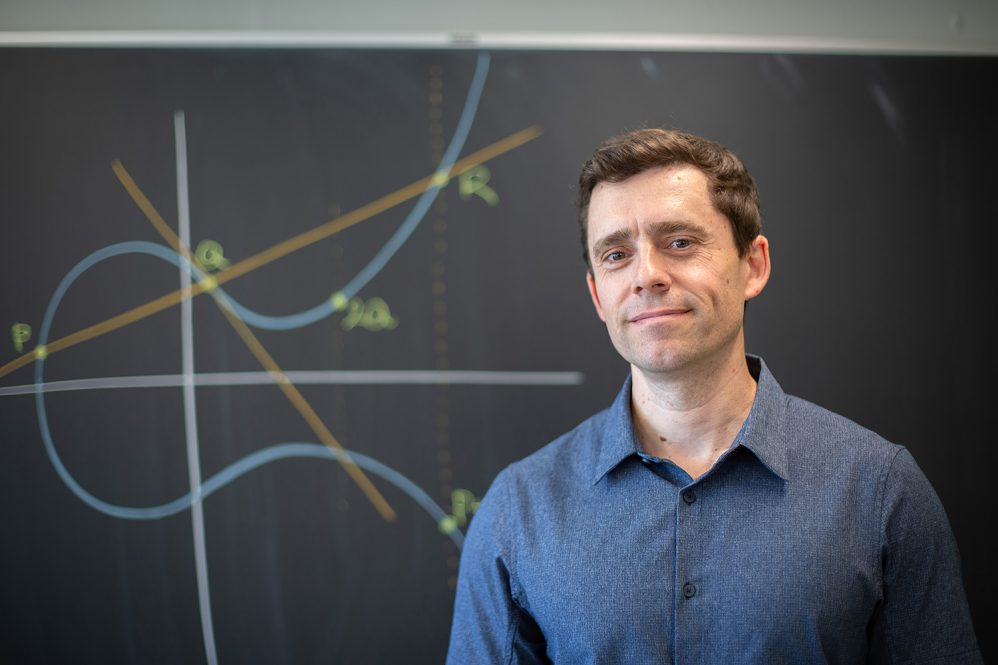If you attended a number theory conference before 2020, you might have caught a glimpse of Professor of Mathematics Álvaro Lozano-Robledo chatting with other mathematicians while eating a Cobb salad.
Lozano-Robledo has always had two things: a love for math and an outgoing personality. So, he jumped at any opportunity to meet new people and talk about math.
“We have a number theory seminar and when we go to lunch with the speaker, I almost invariably eat a Cobb salad,” Lozano-Robledo says. “Something I really enjoy is the social aspect of mathematics — meeting the people that are actually doing mathematics.”
Those interactions came to a halt during the pandemic, impacting Lozano-Robledo’s mental health.
“I struggled during the pandemic,” Lozano-Robledo says. “My mental health was not great. I had a little bit of depression, and the isolation did not do well with me. So, I wanted to find ways to find that sense of community.”
Noticing a lack of advanced math content creators, Lozano-Robledo decided to take to TikTok in January 2021 to share his passion for math. More than three years later, he has amassed over 100,000 followers while working to destigmatize the subject, and increase exposure for his program.
A fun place during an isolated time
Lozano-Robledo began making videos after coming across a TikTok on another platform.
“I had already been lurking on TikTok but did not have an account,” he says.
He made an account to respond to a video with what he calls a “really silly” duet and realized he enjoyed making videos. It was only fitting that Lozano-Robledo made his username “MathandCobb.”
By that point, he realized he could play into social media trends to help people get more comfortable with math.
“I think it matters just to combat math phobia,” Lozano-Robledo says. “One way to do that is to show people that there are people that love math.”
He says he wanted to do the same thing he does with his own two kids: have open conversations about math and show that the subject is not something students need to be afraid of.
Lozano-Robledo uses trends to get math content in front of a general audience.
“I started by finding trends and sounds that were trending and converting them into a math TikTok,” he says.
He joked that he would use lighthearted trending content to help get people’s attention but realized that people would then get curious and begin asking good questions.
“I knew that if I posted about [a particular topic], somebody would ask this type of question that I was after and then I would reply to that with a longer video explaining some of the math behind it,” Lozano-Robledo says.
Some of his videos try to get people to think about math theories, including asking if people think 15.99 divided by 3.99 would be less than, equal to, or greater than 4. After people begin discussing their answers, in the comments, he then posts a second video, explaining ways to solve the problem.
“I think it matters just to combat math phobia,” Lozano-Robledo says. “One way to do that is to show people that there are people that love math.”
Videos contribute to growing interest in the subject
Overall, he thinks his videos help people think about math with a more open mind
“People have written directly to me to tell me that they have chosen to do a math degree because of my videos,” he says. “It is surprising, but it sort of tipped the scale towards math because of what they have seen.”
His videos have also contributed to increased exposure for the Department of Mathematics’ graduate programs.
Vasileios Chousionis, an associate professor of mathematics, and the department’s director of graduate studies, said the department has had a record number of 220 applications this year. Around 46% of applicants are interested in Lozano-Robledo research area of number theory.
Chousionis said many applicants mention Lozano-Robledo’s TikTok videos and associate professor of mathematics Keith Conrad’s expository papers in their applications.
Lozano-Robledo says being on TikTok has helped him become a better teacher and lecturer. Constantly making videos within a specific time limit has taught him to be concise, which he thinks has bled into his teaching.
“I think overall, I might be a better lecturer because I think about how to teach things and say things in more effective ways,” Lozano-Robledo says.
Follow Professor Lozano-Robledo on TikTok here.



